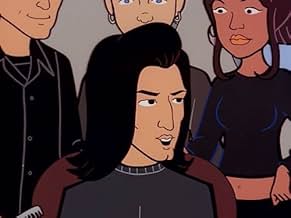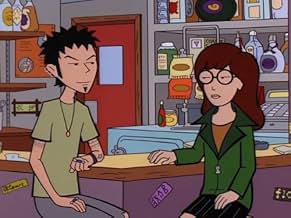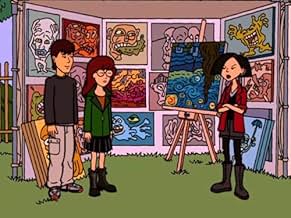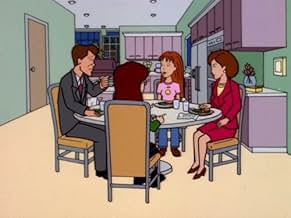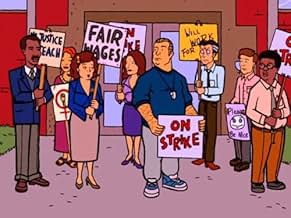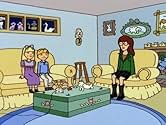Une jeune fille intelligente et cynique traverse sa vie d'adolescente dans un monde où les jeunes sont idiots et les adultes condescendants.Une jeune fille intelligente et cynique traverse sa vie d'adolescente dans un monde où les jeunes sont idiots et les adultes condescendants.Une jeune fille intelligente et cynique traverse sa vie d'adolescente dans un monde où les jeunes sont idiots et les adultes condescendants.
- Récompenses
- 1 victoire et 3 nominations au total
Parcourir les épisodes
Avis à la une
Considering multiple aspects, this is a wonderful show. Every character has a very specific personality, and most all of them actually develop as the show goes on. The humor can be dry, but is incredible if you actually get it. If you were expecting Beavis and Butthead, sorry, you will be disappointed. I've noticed that most of the negative comments talk about how Beavis and Butthead was so much better. I think it can be best said that you have to be able to appreciate intelligent humor to laugh at this. If you think, say, that Jackass is the greatest show ever, then you will most likely hate this.
However, if you like a humorous show that's incredibly well developed for a cartoon (the character development, themes, etc.), then you will enjoy this.
However, if you like a humorous show that's incredibly well developed for a cartoon (the character development, themes, etc.), then you will enjoy this.
The self-defeating world of MTV began as a spark in the mind of one perceptive demographics adviser or another, but soon it grew to epidemic proportions, numbing and sugarcoating all things rebellious in a depressingly successful attempt to convince the masses that nonconformity is all about styles and fads. Any sensible teenager will tell you that it is an unwitting mockery of the things it believes it is making available to an already converted audience, but amongst the throngs of bright colors and loud-but-not-too-loud noises that essentially is MTV, you will occasionally find a gem; an intelligent, insightful, informed show of independent thought, sincerity and sardonic subtlety. "Daria" is one such example.
Anybody who used to watch "Beavis and Butthead" (no comment) will recognize Daria already, as the plain girl with glasses and the monotone voice that would often foil the titular duo's moronic and half-baked plans. When the show began to think about packing it in, MTV approached the creators with the offer of giving Daria her own show. And thank heavens for that. Not only is "Daria" up there with "Frasier" as one of the greatest spin-offs of all time, but it threatens to take a place as one of the greatest stand-alone shows of all time.
Daria Morgendorffer, our bland anti-heroine, is not your average teenage girl. Smart, sarcastic, opinionated but highly unmotivated, her life revolves around observing the actions of others with her best friend Jane Lane, a misfit artist from a family of unconventional thinkers. Together Daria and Jane see fit to mock the sea of stereotypes that is their suburban hometown of Lawndale, mainly the student body of their high school. Daria's deep loathing of all things superficial is regularly tested by the presence of her shallow and materialistic sister Quinn, while her workaholic lawyer mother Helen and her perpetually stressed out and slightly unbalanced father Jake struggle to do the right thing by their daughters in the interactive jumble that is life in Lawndale.
At a mere glance, one might perceive "Daria" as a children's show, due to its animation. However, even the slightest exertion of further examination would reveal that it is no more a children's show than "The Angry Beavers" is a sophisticated portrayal of American Wildlife. Where a lot of shows sell their credibility for cheap laughs and mold their characters on popularity polls, "Daria" is firm in its subtlety, never wavering in its belief that, given time, its audience will get the joke. Some may take longer than others, but all that do never turn back.
The genius of the show lies in its ironic reflection of a culture that would never allow a show like this to get off the ground. Surrounded on all sides by the trivial and materialistic values she lives to hate, Daria takes refuge in the companionship of Jane, the isolated safety of her own room and the glow of the television (which will probably be tuned in to dissocial ironathon news program 'Sick Sad World'), emerging now and again for a futile attempt to significantly impact the alienating world around her. And perhaps the experience might be alienating to us, the audience, if it weren't for the shows strategic and successful ploy to get us to see the world through Daria's eyes. Once there, we're completely hooked, and all the rest of the show's intrinsic jokes fall into place.
Arguably the most enviable quality of animation is its freedom to let characters be exaggerated without being unrealistic. The most brilliant thing about this is that eventually, characters that are truly only meant to serve as tired clichés perversely become beloved, unique personalities. Trent, Jane's lazy soft spoken musician brother with delusions of future stardom with his garage band Mystik Spiral, Kevin and Brittany, quarterback of the football team and head of the cheerleaders respectively, two blissfully ignorant airhead lovers with no aspirations beyond their current high school status, Mr. O'Neal, the hypersensitive English teacher, balanced in the extreme by the borderline psychopathic Mr. DeMartino, an irate History teacher who has lost the will to educate. Even the unbearably shallow and conceited Fashion Club, four fashion-victimized teenage girls who believe their undeservedly elitist circle is doing the world around them a world of good, gradually grow on you until, like it or not, you couldn't imagine Lawndale without them.
It is because of this paradoxical attachment to the characters that serious plot developments towards the end of the series are able to engage the audience on a level that is more than just honesty for the sake of mockery. Once we've grown accustomed to Daria's detached and cynical attitude, the show begins to admit that perhaps it has been having us on a little bit, at least concerning the rigid personalities of our beloved caricature personas. Therefore, once Daria has opened up a smidgeon , so does her/our view of her world, in an event suspiciously symptomatic of personal growth. And from there it's a small step to actually caring about the students, teachers and residents of Lawndale as we farewell them in the "Daria" movie finale "Is It College Yet?", in which we see our little high-schoolers graduate and move on. It says a lot about the show that it is able to gradually soften its bite enough to let us feel for the characters without ever feeling inconsistent.
If one were to only catch a few episodes of "Daria", then they might like what they see, and they'd be well justified. But they'd ultimately be missing out. Because as entertaining as the self-contained half-hour segments of the show can be, the world of Daria is not about separate jokes, separate characters, separate stories or separate anything. Everything within the show works to build to a greater understanding about teenage life, indeed about life in general, and everything it entails; a simple masterpiece that's value only increases when put into social context.
Anybody who used to watch "Beavis and Butthead" (no comment) will recognize Daria already, as the plain girl with glasses and the monotone voice that would often foil the titular duo's moronic and half-baked plans. When the show began to think about packing it in, MTV approached the creators with the offer of giving Daria her own show. And thank heavens for that. Not only is "Daria" up there with "Frasier" as one of the greatest spin-offs of all time, but it threatens to take a place as one of the greatest stand-alone shows of all time.
Daria Morgendorffer, our bland anti-heroine, is not your average teenage girl. Smart, sarcastic, opinionated but highly unmotivated, her life revolves around observing the actions of others with her best friend Jane Lane, a misfit artist from a family of unconventional thinkers. Together Daria and Jane see fit to mock the sea of stereotypes that is their suburban hometown of Lawndale, mainly the student body of their high school. Daria's deep loathing of all things superficial is regularly tested by the presence of her shallow and materialistic sister Quinn, while her workaholic lawyer mother Helen and her perpetually stressed out and slightly unbalanced father Jake struggle to do the right thing by their daughters in the interactive jumble that is life in Lawndale.
At a mere glance, one might perceive "Daria" as a children's show, due to its animation. However, even the slightest exertion of further examination would reveal that it is no more a children's show than "The Angry Beavers" is a sophisticated portrayal of American Wildlife. Where a lot of shows sell their credibility for cheap laughs and mold their characters on popularity polls, "Daria" is firm in its subtlety, never wavering in its belief that, given time, its audience will get the joke. Some may take longer than others, but all that do never turn back.
The genius of the show lies in its ironic reflection of a culture that would never allow a show like this to get off the ground. Surrounded on all sides by the trivial and materialistic values she lives to hate, Daria takes refuge in the companionship of Jane, the isolated safety of her own room and the glow of the television (which will probably be tuned in to dissocial ironathon news program 'Sick Sad World'), emerging now and again for a futile attempt to significantly impact the alienating world around her. And perhaps the experience might be alienating to us, the audience, if it weren't for the shows strategic and successful ploy to get us to see the world through Daria's eyes. Once there, we're completely hooked, and all the rest of the show's intrinsic jokes fall into place.
Arguably the most enviable quality of animation is its freedom to let characters be exaggerated without being unrealistic. The most brilliant thing about this is that eventually, characters that are truly only meant to serve as tired clichés perversely become beloved, unique personalities. Trent, Jane's lazy soft spoken musician brother with delusions of future stardom with his garage band Mystik Spiral, Kevin and Brittany, quarterback of the football team and head of the cheerleaders respectively, two blissfully ignorant airhead lovers with no aspirations beyond their current high school status, Mr. O'Neal, the hypersensitive English teacher, balanced in the extreme by the borderline psychopathic Mr. DeMartino, an irate History teacher who has lost the will to educate. Even the unbearably shallow and conceited Fashion Club, four fashion-victimized teenage girls who believe their undeservedly elitist circle is doing the world around them a world of good, gradually grow on you until, like it or not, you couldn't imagine Lawndale without them.
It is because of this paradoxical attachment to the characters that serious plot developments towards the end of the series are able to engage the audience on a level that is more than just honesty for the sake of mockery. Once we've grown accustomed to Daria's detached and cynical attitude, the show begins to admit that perhaps it has been having us on a little bit, at least concerning the rigid personalities of our beloved caricature personas. Therefore, once Daria has opened up a smidgeon , so does her/our view of her world, in an event suspiciously symptomatic of personal growth. And from there it's a small step to actually caring about the students, teachers and residents of Lawndale as we farewell them in the "Daria" movie finale "Is It College Yet?", in which we see our little high-schoolers graduate and move on. It says a lot about the show that it is able to gradually soften its bite enough to let us feel for the characters without ever feeling inconsistent.
If one were to only catch a few episodes of "Daria", then they might like what they see, and they'd be well justified. But they'd ultimately be missing out. Because as entertaining as the self-contained half-hour segments of the show can be, the world of Daria is not about separate jokes, separate characters, separate stories or separate anything. Everything within the show works to build to a greater understanding about teenage life, indeed about life in general, and everything it entails; a simple masterpiece that's value only increases when put into social context.
It amazing to see what MTV airs now, and to see Daria. Daria is a twisted view of what MTV portrays now: Skinny, white, girls that only talk about fashion, sex, and boys. Daria shows our world through the eyes of a jaded girl who doesn't give a crap for anything.
It is a comedy that, give it time, and you'll be cracking up. Daria's delivery of all her lines is still hilarious today. Quinn's voice might get to you, but soon it doesn't matter. Every character is interesting, and it is just a show. Funny show.
It lost its steam when Daria got a boyfriend, but don't watch those episodes. Just keep to seasons 1-3 and you'll be laughing your ass off.
It is a comedy that, give it time, and you'll be cracking up. Daria's delivery of all her lines is still hilarious today. Quinn's voice might get to you, but soon it doesn't matter. Every character is interesting, and it is just a show. Funny show.
It lost its steam when Daria got a boyfriend, but don't watch those episodes. Just keep to seasons 1-3 and you'll be laughing your ass off.
I'm 34 years old as of this writing, so why do I like this spin-off of Beavis and Butt-head? The sarcasm of Tracy Grandstaff will sting you with laughter, not to mention Miss Morgendorffer's refusal to go along with the "conform-or-die" mentality that's forced upon teenagers, whether it's from her elders, the popular creeps, or the various counter-cultures. Imagine a girl like her in previous decades of teen-dom. Her attitude toward peer pressure is close to the one I had when I was in high school (..and now feel even stronger about), as is her Dad's seething resentment toward the people who robbed him of the "joy of youth."
Long live Daria. If the show doesn't last, may it's legacy do so.
Long live Daria. If the show doesn't last, may it's legacy do so.
Daria Morgendorffer gets her own show, after being featured in some of Beavis and Butt-head's episodes. Daria gets a new look and personality. What makes this show so unique is that it focuses on adolescent life seen through the eyes of a teenage girl. What makes her funny is that she communicates with everyone in a sarcastic manner, including her family. She is very unpopular in school whereas her sister, Quinn, tries to be so cute and awards herself too much credit for it. Let's not forget her parents, Jake and Helen. They are the stereotypical career-minded type, enough said. Jane is Daria's best friend who always stands by her through good and bad times. Daria may not be a laugh-a-minute show, but rather a social satire about growing up. If you love Beavis and Butt-Head, then give this one a try.
My evaluation: B+
My evaluation: B+
Le saviez-vous
- AnecdotesJane, Quinn, and Helen are all voiced by the same actress, Wendy Hoopes.
- GaffesThroughout the series there are shots of Miss Li talking to the students in the auditorium and Trent (Jane's brother) is clearly visibly in many of the shots although he's much older and had already graduated high school 5 years earlier.
- Citations
Trent Lane: [his breathy greeting to everyone] H-hey.
- Crédits fousDuring the closing credits, the show's characters appear in various costumes.
- Versions alternatives'Daria' episodes released on home video/DVD have their original MTV broadcast version music clips removed and are replaced by more generic stock music.
- ConnexionsFeatured in America's Teenagers Growing Up on Television (1998)
Meilleurs choix
Connectez-vous pour évaluer et suivre la liste de favoris afin de recevoir des recommandations personnalisées
Détails
Contribuer à cette page
Suggérer une modification ou ajouter du contenu manquant



